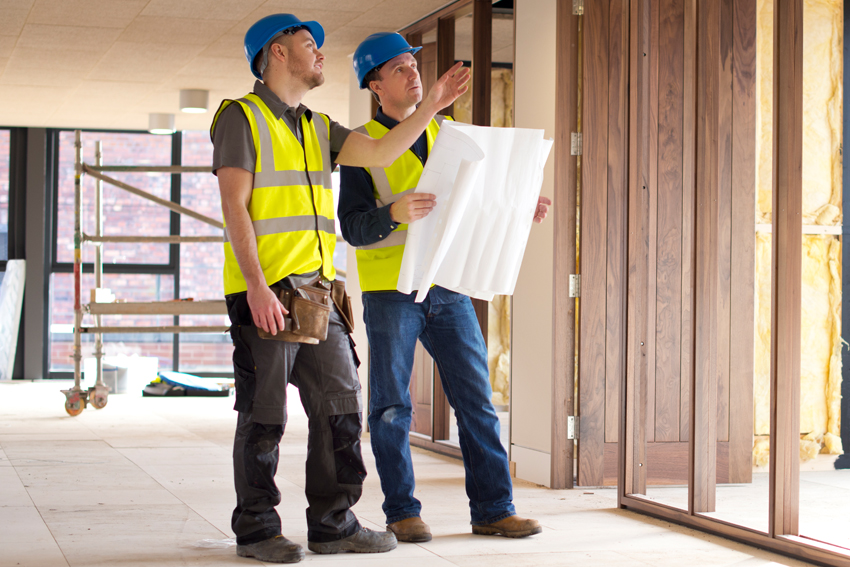Stay safe as houses

Health and Safety rules are much more than the small print contained on clipboards.
They’re integral to the successful management of any construction site or trades project and do an important job protecting everyone’s wellbeing.
Of course, this doesn’t mean all the regulations make sense. From the silly and sublime to the really ridiculous, there are some corkers out there.
A recent survey by Dickies Workwear revealed more than 61% of participants had experienced a ban on wearing shorts on-site, even on those days when the UK’s summer heatwaves reached their peak.
Similarly, 31% of participants had been told not to wear short sleeves, as more companies adopt a long-sleeve personal protective equipment (PPE) policy.
Maybe construction managers simply have a thing about knobbly knees and dodgy tattoos?
The survey also showed 63% of participants had not been allowed to listen to the radio. It does seem churlish to ban Steve Wright In the Afternoon, but it can be argued listening out for your love song request distracts you from focusing on completing your plumbing or wiring tasks properly and safely.
The fact is, while some rules make us groan – ‘It’s health and safety gone mad, I tell you!’ – there’s no denying most are absolutely vital.
In the construction industry in the UK, 3% of workers sustain a work-related injury and 11% of these injuries are from being struck by an object. Another 66,000 minor scrapes are believed to go unreported every year.
That’s why, while it isn’t always compulsory to wear a safety helmet if there’s no risk of head injuries, on most sites wearing a hard hat is just plain common sense.
Similarly, according to the Health and Safety Executive (HSE), handling, lifting or carrying can create excessive stresses and strains on the body. So, it’s in everyone’s best interest not to exceed weight restrictions. Put down those paving slabs, Bert!
For the years 2017-18, HSE has also published figures indicating there were 1.4 million employees suffering from a work-related illness, 144 deaths in the workplace and over 555,000 injuries at work. As well as being bad news for employees, employers suffer too – with figures showing almost 3.9 million workdays lost due to injuries at a cost of around £15 billion.
Thankfully, it’s not all doom and gloom, concern and calamity.
Independent research has shown employing a Health and Safety Officer can reduce workplace accidents by as much as 50 per cent: that’s a whole big crate of banana skins sidestepped.
They may have even been dubbed The Fun Police but in the workplace Health and Safety Officers carry out the most important role imaginable: keeping everyone safe and sound. In construction and trades, especially, where workers can be found using heavy machinery or hazardous chemicals as part of their daily routine, they are indispensable.
Inspecting and maintaining equipment, keeping an official log of any hazards or accidents and making recommendations for improvement are also their responsibility.
As well as working closely with building company management, the officer is a point of contact for construction workers, machine operators and trade union officials.
Employers must abide by the Health and Safety at Work Act of 1974 and construction and trades sectors also have their own strict codes of conduct. These cover every element of the workplace, including staff welfare, fire risk, site management, using tools, using hazardous materials, using electricity and ensuring the safety of the public, to name but a few.
By law it’s the responsibility of employers to make sure such measures are in place and the job of the Health and Safety Officer to ensure companies meet all requirements. But it’s imperative, too, all employees follow the rules.
This means keeping everyone up to speed on best practice and changes in workplace legislation – and providing training in how to operate new machinery is also key.
Of course, there are simple measures construction workers and tradespeople can take themselves to reduce risks.
Site managers, in particular, like to have everything and everyone in their right place. On a building site this is primarily for health and safety and in a customer’s home it’s just good manners – keeping jobs neat, tidy and to the highest standard is not only polite, it’s good business sense.
For many tradespeople a van is also a mobile workspace so it’s vital its contents are well organised.
Not only will this make it easier for you to get your hands on tools and materials and keep an eye of stock levels, it will save you precious time.
It could also prevent heavy tools falling out of the doors and on to your delicate tootsies (though, of course, you’ll be wearing steel toe caps just in case!).
If you’re seeking a role in the construction or trades sector, check out the latest vacancies on jobs24.com now. It’s the safest route to a brand-new career.
Posted on August 8, 2019
Topics
Recent
- <strong>How to Become an IT Professional in England: Qualifications and Skills for the Role</strong>
- How to Email Your CV: A Guide for Jobseekers in England & Wales
- Exploring Rewarding Careers in the Third Sector and Further Education in England
- Setting up your first LinkedIn profile
- Dealing with the ‘Summer Scaries’
- Unlocking Career Success: How to Make the Most of Jobs24
- Common questions asked in an interview and how to answer them
- Questions to Ask at the end of an Interview
